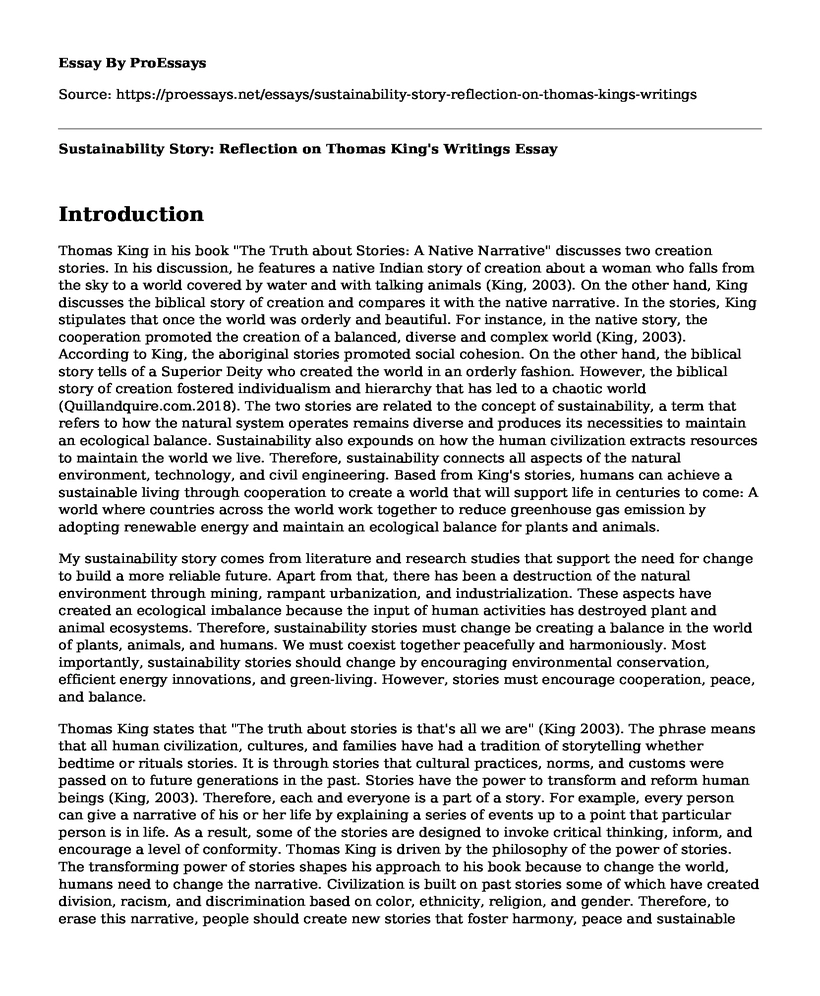Introduction
Thomas King in his book "The Truth about Stories: A Native Narrative" discusses two creation stories. In his discussion, he features a native Indian story of creation about a woman who falls from the sky to a world covered by water and with talking animals (King, 2003). On the other hand, King discusses the biblical story of creation and compares it with the native narrative. In the stories, King stipulates that once the world was orderly and beautiful. For instance, in the native story, the cooperation promoted the creation of a balanced, diverse and complex world (King, 2003). According to King, the aboriginal stories promoted social cohesion. On the other hand, the biblical story tells of a Superior Deity who created the world in an orderly fashion. However, the biblical story of creation fostered individualism and hierarchy that has led to a chaotic world (Quillandquire.com.2018). The two stories are related to the concept of sustainability, a term that refers to how the natural system operates remains diverse and produces its necessities to maintain an ecological balance. Sustainability also expounds on how the human civilization extracts resources to maintain the world we live. Therefore, sustainability connects all aspects of the natural environment, technology, and civil engineering. Based from King's stories, humans can achieve a sustainable living through cooperation to create a world that will support life in centuries to come: A world where countries across the world work together to reduce greenhouse gas emission by adopting renewable energy and maintain an ecological balance for plants and animals.
My sustainability story comes from literature and research studies that support the need for change to build a more reliable future. Apart from that, there has been a destruction of the natural environment through mining, rampant urbanization, and industrialization. These aspects have created an ecological imbalance because the input of human activities has destroyed plant and animal ecosystems. Therefore, sustainability stories must change be creating a balance in the world of plants, animals, and humans. We must coexist together peacefully and harmoniously. Most importantly, sustainability stories should change by encouraging environmental conservation, efficient energy innovations, and green-living. However, stories must encourage cooperation, peace, and balance.
Thomas King states that "The truth about stories is that's all we are" (King 2003). The phrase means that all human civilization, cultures, and families have had a tradition of storytelling whether bedtime or rituals stories. It is through stories that cultural practices, norms, and customs were passed on to future generations in the past. Stories have the power to transform and reform human beings (King, 2003). Therefore, each and everyone is a part of a story. For example, every person can give a narrative of his or her life by explaining a series of events up to a point that particular person is in life. As a result, some of the stories are designed to invoke critical thinking, inform, and encourage a level of conformity. Thomas King is driven by the philosophy of the power of stories. The transforming power of stories shapes his approach to his book because to change the world, humans need to change the narrative. Civilization is built on past stories some of which have created division, racism, and discrimination based on color, ethnicity, religion, and gender. Therefore, to erase this narrative, people should create new stories that foster harmony, peace and sustainable living. In summation, I support King's philosophy because the written and spoken narrative has an influential impact on a person's life. The human civilization should create stories that foster cohesion and the respect for diversity to build a better world.
References
Quillandquire.com. (2018). The Truth About Stories: A Native Narrative | Quill and Quire.
Retrieved 13 March 2018, from https://quillandquire.com/review/the-truth-about-stories-a-native-narrative/
King, T (2003). The Truth about Stories. Retrieved 13 March 2018, from
http://www.cbc.ca/radio/ideas/the-2003-cbc-massey-lectures-the-truth-about-stories-a-native-narrative-1.2946870
Cite this page
Sustainability Story: Reflection on Thomas King's Writings. (2022, Apr 04). Retrieved from https://proessays.net/essays/sustainability-story-reflection-on-thomas-kings-writings
If you are the original author of this essay and no longer wish to have it published on the ProEssays website, please click below to request its removal:
- Feminism in Frankenstein Essay
- Formalist Analysis of Dry September By Faulkner William
- The History of Mary by Mary Prince Essay
- Exquisite Corpse Literacy Narrative Essay
- A Battle With Grendel in Beowulf Essay Example
- Essay Example on Top Girls & A Raisin in the Sun: Women's Place in Society
- Essay Example on Elisenda's Sigh of Relief: Genuine or Selfish?







